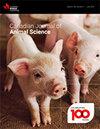饲粮混合种直接饲喂微生物(益生菌)对育肥猪生长性能、气体排放、肉品质、营养物质消化率和粪便评分的影响
IF 1
4区 农林科学
Q3 AGRICULTURE, DAIRY & ANIMAL SCIENCE
引用次数: 0
摘要
本试验旨在研究混合种直接饲喂微生物(DFM)对育肥猪生长性能、气体排放、肉品质、营养物质消化率和粪便评分的影响。试验选用100头体重为58.97±3.12 kg的杂交育肥猪((约克×长)×杜洛克),随机饲喂2种饲粮(每栏5头猪(2个母猪和3个后备母猪);每次处理50头猪),为期8周的试验。饲粮处理包括基础饲粮不加益生菌控制或基础饲粮+(0.1%)混合益生菌(DFM)。混合添加DFM有增加育肥猪第56天体重的趋势(P = 0.093)。与对照组相比,混合益生菌显著提高了第5-8周的平均日增重(P = 0.024)和总体(P = 0.013)。与对照组相比,添加dfm的饲粮在第4周和第8周显著降低了甲烷和nh3的排放。补充DFM不影响h2s、甲基硫醇、乙酸或二氧化碳的排放。混合添加DFM有提高氮消化率的趋势(P = 0.07)。饲喂混合DFM的猪在不影响肉质、营养物质消化率、肠道微生物和粪便评分的情况下,提高了平均日增重,减少了nh3和ch4排放。本文章由计算机程序翻译,如有差异,请以英文原文为准。
An evaluation of the effects of dietary mixed-species direct-fed microbial (probiotic) on growth performance, gas emissions, meat quality, nutrient digestibility, and fecal score in finishing pigs
This study examined the effects of mixed-species direct-fed microbial (DFM) on growth performance, gas emissions, meat quality, nutrient digestibility, and the fecal score of finishing pigs. A total of 100 crossbred finishing pigs ((Yorkshire × Landrace) × Duroc) weighing 58.97 ± 3.12 kg were randomly assigned to one of two diets (5 pigs per pen (2 barrows and 3 gilts); 50 pigs per treatment) in an 8-week trial. Dietary treatments comprised of the basal diet without probiotics control or basal diet + (0.1%) mixed probiotics (DFM). Mixed DFM supplementation showed a tendency to increase ( P = 0.093) the body weight of finishing pigs during day 56. Comparing mixed DFM with the control diet, mixed probiotics significantly improved average daily gain (ADG) during weeks 5–8 ( P = 0.024) and overall ( P = 0.013). DFM-supplemented diets reduced the emission of CH 4 and NH 3 significantly at weeks 4 and 8 compared with control. DFM supplementation did not affect H 2 S, methyl mercaptans, acetic acid, or CO 2 emissions. Mixed DFM supplementation showed a tendency to increase ( P = 0.07) nitrogen digestibility. Pigs receiving mixed DFM had improved ADG and reduced NH 3 and CH 4 emissions without affecting meat quality, nutrient digestibility, intestinal microbes, and fecal score.
求助全文
通过发布文献求助,成功后即可免费获取论文全文。
去求助
来源期刊

Canadian Journal of Animal Science
农林科学-奶制品与动物科学
CiteScore
2.30
自引率
0.00%
发文量
51
审稿时长
6 months
期刊介绍:
Published since 1957, this quarterly journal contains new research on all aspects of animal agriculture and animal products, including breeding and genetics; cellular and molecular biology; growth and development; meat science; modelling animal systems; physiology and endocrinology; ruminant nutrition; non-ruminant nutrition; and welfare, behaviour, and management. It also publishes reviews, letters to the editor, abstracts of technical papers presented at the annual meeting of the Canadian Society of Animal Science, and occasionally conference proceedings.
 求助内容:
求助内容: 应助结果提醒方式:
应助结果提醒方式:


